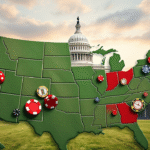🇬🇧 A Long-Awaited Reckoning
After years of delays, leaks, speculation, and political ping-pong, the UK Gambling White Paper finally dropped. Billed as the most significant regulatory overhaul since the 2005 Gambling Act, it was supposed to reshape the British gambling landscape to suit the digital age.
Instead, it triggered a polarized response:
To some, it’s a long-overdue shift toward player protection.
To others, it’s a watered-down document—overcautious, half-baked, and ill-suited for the 2025 gambling economy.
📜 What’s Actually in the White Paper?
The white paper introduced several key reforms. On the surface, these sound impactful:
✅ Key Proposals:
- Statutory levies on gambling operators to fund research, education, and treatment.
- Affordability checks for online bettors showing high levels of spend or loss.
- Online slot stake limits (proposed at £2–£15).
- New licensing requirements for white-label partnerships.
- Stronger age-gating and identity checks.
- Limits on bonus incentives and “VIP” customer exploitation.
Sounds good? Sure. But the industry isn’t convinced.
⚖️ The Core Criticism: All Bark, No Bite
1. Affordability Checks Are Vague and Voluntary
One of the most hotly debated issues—affordability checks—has no teeth. The paper suggests thresholds and encourages soft checks, but there’s no centralized data source, no mandatory income verification, and wide room for interpretation.
Critics say it’s “trust-based regulation” in an environment where trust has been eroded.
2. Slot Limits with Wiggle Room
The £2–£15 stake cap for slots? It’s still out for consultation. No confirmed number. No fixed date for rollout. Meanwhile, thousands of players continue to lose thousands per day on fast-paced slot games.
3. Delayed Implementation Timelines
Despite being years in the making, many proposals are not live yet and may require further reviews, pilot programs, or legislative amendments. By the time they’re enforced, new gambling models (e.g., crypto casinos) could have already bypassed the framework.
💸 The Industry Reacts: Relief Meets Shrug
Big operators like Entain, Flutter, and Bet365 breathed a sigh of relief. The feared advertising bans or sponsorship blocks didn’t materialize. Even the levy is modest compared to European counterparts.
On the other hand, reform advocates and public health bodies saw it as a missed opportunity.
Quote from Gambling With Lives (advocacy group):
“The white paper is a betrayal of the families who’ve lost loved ones to gambling harm. It bends over backward to protect profits.”
🏛️ Political Timing and Influence
Let’s not forget—this white paper was drafted under three Prime Ministers, delayed by Brexit, COVID, and general elections.
Industry lobbying was intense. Reports suggest that operators spent millions on legal, lobbying, and political consultancy fees. Meanwhile, whistleblowers allege that early drafts included much tougher restrictions that were later toned down.
It’s regulation by compromise, not conviction.
📉 Real-World Impact So Far
Despite criticism, some changes are being felt:
- Operators are tightening bonuses to avoid scrutiny.
- White-label brands are disappearing, unable to meet compliance demands.
- Media companies are reviewing their affiliate partnerships.
- Crypto casinos with no UKGC licenses are gaining underground traction, dodging all the rules.
But have gambling harms significantly declined? It’s too soon to tell—and many argue no, not yet.
📱 The Digital Gap
The 2025 White Paper was meant to future-proof UK gambling laws. But many in the tech space feel it’s still 10 steps behind:
- No clear guidance on loot boxes or NFTs in gaming.
- No clarity on crypto or blockchain gambling.
- Minimal controls on AI-based personalization and targeting.
- Streaming platforms like Twitch and Discord remain largely unregulated.
As tech races ahead, regulation chases behind.
🌐 A Global Perspective: The UK Is No Longer Leading
Once hailed as a model of forward-thinking regulation, the UKGC is no longer the gold standard.
| Region | Regulatory Trend |
| Netherlands | Tighter licensing, strict marketing bans |
| Ontario | Clean, legal, locally ring-fenced market |
| Germany | Tough taxes, centralized player protection |
| US States | Gradual rollout with state-by-state oversight |
| Australia | Cracking down on gambling ads and bonus abuse |
In contrast, the UK appears to be managing decline, not leading innovation.
🔮 Where Do We Go from Here?
A second white paper?
Possibly. There’s growing momentum for:
- Real-time, bank-linked affordability checks
- AI audits for targeting and marketing
- Tighter rules on streaming and influencer promotions
- Hard caps on time and money spent per player
But the real issue is this:
Does the UK have the political will to put public health above profit margins?
✍️ Final Thoughts: Regulation Without Resolve?
The UK White Paper is a symbol of intention, not transformation. It reads like a document written to appease all sides while committing to none.
For an industry that’s evolving daily, this is a problem. Players need protection. Operators need certainty. Tech platforms need clarity.
And as more young, vulnerable users engage with gambling-like products, “too soft, too late” might become a recurring theme in global regulation.











